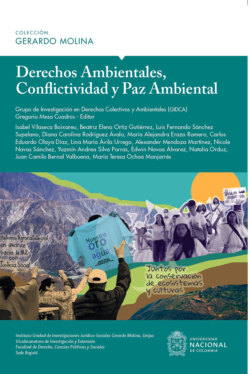Читать книгу Derechos Ambientales, conflictividad y paz ambiental - Gregorio Mesa Cuadros - Страница 15
На сайте Литреса книга снята с продажи.
Concept and basis of rights
ОглавлениеTheories, history and practice of human rights contain a series of concepts, foundations, justification and legitimacy of the same, regarding their existence, permanence or disappearance, where human beings, mainly from the academy, produce reasons and arguments to specify, expand, reduce and interpret what we call rights.
Since scholars have been researching on this topic for more than 20 years, it is imperative that we specify its content from the university, because rights can be understood not only as norms or as attributes of humans, but also as a dynamic set of social and cultural action-reactions arising from concrete contexts of relations between humans and their environment, in two great dimensions, their universalization and specification, not only for a few humans but for all of them and other beings.
As Ferrajoli (1999) points out, rights are nothing more than socially shared meanings and as such do not fall from the sky nor affirm in a day but are the result of long processes through which their normative statements are sedimentary in the collective conscience and, above all, those of the victims of their violations.
These rights incorporate principles, rules and diverse forms of articulation of individual and collective actions as a result of social, economic, cultural and political processes in defense of environmental (human and ecosystemic) dignity, with the occasion of the existence of environmental conflict in a specific place.
Theories of law that have been constructed to speak of rights, guarantees, freedoms or faculties in the heads of a few, many or all human beings are diverse, but in the last decades, the idea of the need for extending the scope of protection of subjects to other beings, beyond just human beings.
Most of these theories emphasize the human, and specifically on the interest of a few humans so that rhetorically formally state in normative political-juridical discourses, the idea that these rights belong to everyone.
Such theories range from the most restrictive androcentrism to the generalization or universalization of liberal rhetoric that all humans are subjects of law, going through the various anthropocentric theories that emphasize, more or less, who are or are not subjects of law, from when and how many rights can be had and by what political-legal mechanisms can be obtained.
Within the main theories of rights in the last two centuries against the abstract Universalist theories promoted by modern liberal thought, we have, among others, the Iusrealist, Marxist, republicanism, feminism, communitarian, multiculturalist, interculturalist and decolonial theories. They try to respond to the deficit of material protection of what we have called rights, but they suffer, in one way or another, from broad and compressive contents of the globality of the dynamics of the human relationship with each other, with other cultures and with ecosystems and the environment in general.
In the last two decades in South America, particularly in Ecuador and Bolivia, the debate on rights beyond human beings has become more dynamic. As Indigenous Peoples and societies are considered the majority in those countries, they have introduced in their beliefs a strong connection to the environment. For example, the idea of buen vivir or “good living”, Pacha Mama or “Mother Earth”, are approaches that recognize the environmental dignity. It is expressed in that is the representation of Mother, Master and Holy and allowed in their respective Political Constitutions. Therefore, we have with it a duty of special care, because human life and other beings depend on how well we preserve the environment in the present and the future.
From our perspective, and taking into account our academic and research processes (Mesa Cuadros, 2015d), both the University and various ethnic and traditional peoples, as well as peasant and marginalized urban communities, which have usually been subjected to environmental displacement, have expressed a persistent desire of recognition of the rights of Nature, ecosystems, animals and other beings that are in them.
Such a legal basis is expressed in specifying who is precisely responsible for generating environmental problems and conflicts by unjustified appropriation of the environment and impacts on ecosystems and cultures, as this defines the degree of responsibility for actions or omissions of States, corporations or human beings as individuals.
For that reason, this legal basis has in the principles of responsibility, solidarity, sustainability and environmental prevention, the four pillars for the search and concretion of environmental justice. It passes through a discipline of Environmental Law that emphasizes in new principles and new political and legal procedures different from those that currently exist. However, these privileges only a few human beings with power and forgets the rights and interests of those who do not have power, because they are not yet subject, or because they are not materially part of the existing moral community.
This is because a debate about responsibility must show its multiple facets and dimensions without neglecting both the generational responsibility for present and future generations (human generational responsibility), as well as other non-human beings, both present and future generation (responsibility inter-species), where the environment or nature is the existential foundation of human beings and other present and future species.
